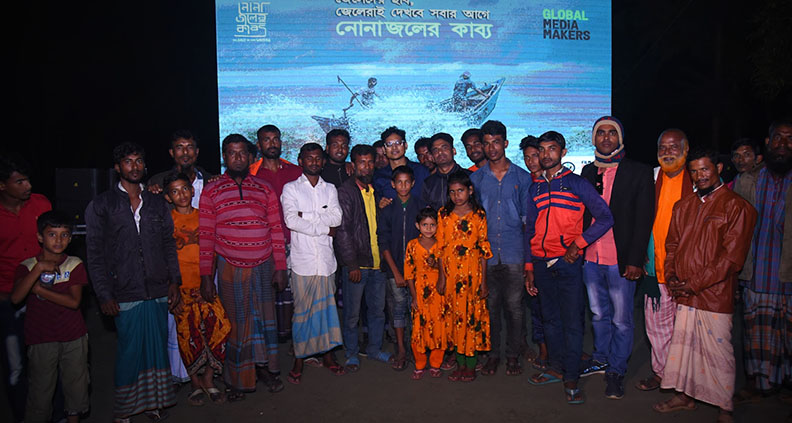
EDITOR’S NOTE: The piece below originally ran in April of this year. We’re reposting it here in anticipation of the upcoming LA Residency portion of the 2022 Film Independent Global Media Makers Program. Special thanks to Rezwan Shahriar.
***
For 2019 Global Media Makers Fellow Rezwan Shahriar Sumit, his small-scale narrative feature, The Salt in Our Waters, about an embattled fishing community in southern Bangladesh—the coastal Patuakhali District—has blossomed into something much larger. The film has played at festivals worldwide. A series of community screenings brought the film to its participants in the region and opened a dialogue between villagers and local government. And a follow-up documentary further chronicling the displaced fishing community is already in production.
The film’s impact beyond mere exhibition is important to Sumit, who, after studying filmmaking at NYU’s Tisch School of the Arts, decided to relocate back to his native country. “My story was in Bangladesh,” he says—and specifically, it turned out, among the fisher folk communities in underdeveloped coastal Patuakhali. There, over many years, he befriended the community, leading to Salt, his first feature.
After participating in Global Media Maker’s LA residency in 2019, Sumit applied for a program microgrant in order to realize his goal of bringing the film—and its potential social benefits—back to its subjects, particularly in the wake of ongoing hardships handed down from both man and nature.
We recently spoke to Sumit about the film and its many ambitious tentacles, his upcoming Sloan-supported project, A New Prophet, and the many facets of his Global Media Makers experience. Here’s the conversation:
REZWAN SHAHRIAR SUMIT
To start, can you tell me where you are right now and what you’re currently working on?
Sumit: Sure. I’m currently in Dhaka, Bangladesh. My hometown. And right now I’m currently working on a follow-up documentary [to The Salt in Our Waters] called The Tide is Rising, which sort of traces the fisher folks who helped me make the film. The hamlet where we shot the film, where 22 fishing families have lived together for the last 30 years, got washed away. So I’m tracing those folks and where they’re living now. So that’s what I’m following.
Are you still shooting the documentary?
Sumit: We’ve had a couple phases of shooting. What I’m doing now is assessing the situation there [in Patuakhali] and the effort to rehabilitate these communities. We organized a screening of The Salt in Our Waters—supported by a Film Independent Global Media Makers program microgrant—on the oceanfront, where one of the villages used to be. I invited the commissioner [of the region] to come see the film, but also to see how their [the fishermen] lives are changing, to interact with them, and listen to the tragic things that have happened to them. Not only had the ocean displaced them, but they had tried to rebuild around the edges of the forest and the forest service got very mad and evicted them. So this is both a natural calamity and also a man-made problem.
Tell me about that whole process: receiving the Global Media Makers microgrant and applying it towards this project.
Sumit: The film premiered in London at the BFI London Film Festival back in 2020. And it’s been in some prominent film festivals—more than 25 festivals worldwide. All of that is great, you know. I’m in the limelight; people are talking about me and asking me questions. But I started to realize that they [the fishermen] are not part of this conversation and that they hadn’t been able to watch the film yet. So I wanted to bring the film to them and, because it’s in a very remote part of Bangladesh, I needed financial resources to make it happen. We thought, “Why not do this as a pilot program and show the film in a couple other villages around there as well?” My proposal was three screenings. And, if they’re successful, why not pitch this program to other organizations—local NGOs who have longstanding programs with the fisher folk who live around these coastal lands. And, of course, I wanted to share the film with the people who helped make it. So that’s precisely what happened and that became big news because the media, journalists, filmmakers, politicians—they had all gone to that part of Bangladesh, had their photo ops, and never followed up. The fact that someone went back was big news.

What was the response from the community once they actually saw what you’d been working on?
Sumit: Some of them got really emotional—they were seeing their village the way it used to be three years ago. They were able to recall all their memories there, especially the kids in the film who were born there. It’s not like they were sad. They were happy someone had cared and had taken the time to tell their story. They were also very involved in the screenwriting process—without their stamp of approval I never would have shot there. I shot the film in 2018, and I’ve been going there since 2015, so I’ve been able to develop a friendship with them. For me it was the best film-going experience ever. The fact that GMM was on board with me for this process and approved the microgrant made me so happy.
Walk me through your experience with Global Media Makers, in general. You were part of the 2019 LA residency, correct?
Sumit: Yes. I was actually there with my second feature, A New Prophet, which is a science fiction film set in Bangladesh. I went to film school at NYU and the graduate film program at Tisch, so I know how the film system works in the US. But, prior to GMM, I had never been to LA. And you kind of have to be in LA to get the full picture of how film financing and film production works in the US. I also had meetings regarding The Salt in Our Waters as well, how to get the film distributed and how to get into festivals.
Oh cool. It’s great you were able to utilize that time to advance multiple projects.
Sumit: Yes. The biggest experience I had in LA was that I got to make my first VR film. A New Prophet is actually set in the world of VR—about a guy who develops VR experiences. It was key that I got to experience the making of a VR film. I got to screen it at the Disney headquarters during the GMM closing ceremony, where lots of interesting people were present in the audience.
Are you still in development on A New Prophet?
Sumit: I decided to take a break from A New Prophet so I could properly finish and distribute The Salt in Our Waters. Now that theatrical distribution is done, I’m officially transitioning back to A New Prophet. While I was in NYU back in 2017, I won the $100,000 Sloan grant for the film, so that money is still there. So, I’d love to shoot in 10-12 months.
Lastly, why do you think it’s important for US-based organizations, like Film Independent, to engage with the international film community through programs like Global Media Makers?
Sumit: The film infrastructure in Bangladesh is at such a basic level. There’s literally no ecosystem here. In New York I felt I was in a very safe bubble; everyone in the community was helping everybody else advance. But I also realized I wasn’t going to make my feature in the US because my story was in Bangladesh. And once I made the move, I found that there is a lack of technical crew in Bangladesh and whatever financing there is is for Bollywood-style films. Also, the theater system here is falling apart. They haven’t been able to upgrade their screens. I was like, “Oh my god, how am I going to make my film and get it out there? And I’m an NYU graduate!” Imagine someone who did not have the luxury of going to that school, who is from Bangladesh, and has hundreds of stories to tell. For countries like Bangladesh, Nepal, Sri Lanka… GMM can make a real difference. Not only through microgrants but also the international workshops they do. So yes, it’s immensely important that GMM continues to bear the load that it’s bearing in other parts of the world.
To learn more about Rezwan Shahriar Sumit and The Salt in Our Waters—including how to watch the film and the filmmakers’ ongoing direct-impact efforts in the Bangladeshi peninsula—be sure to check out the film’s website. Learn more about Global Media Makers and Film Independent’s International Programs here.
Film Independent promotes unique independent voices, providing a wide variety of resources to help filmmakers create and advance new work. Become a Member of Film Independent here. If you’d like, donate to support us here.
Keep up with Film Independent…
(Header: Sumit at a community screening in Bangladesh)














